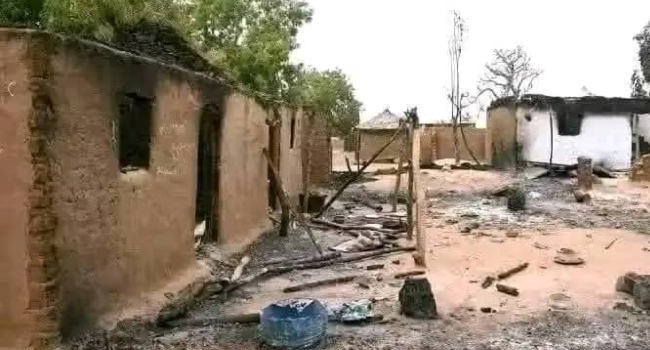Benue State Governor, Hyacinth Alia, has claimed that the perpetrators of the recent wave of killings across the state are not Nigerians, stating that they speak unfamiliar languages and exhibit foreign characteristics.
Governor Alia disclosed this on Tuesday while speaking as a guest on Politics Today, a current affairs programme on Channels Television in the wake of assaults on the North-Central state that have left scores killed and many displaced.
When asked about the identity of the attackers terrorising communities in the state, the governor said it was important to first clarify the nature of the threat.
Let’s have the narrative very correct. We know Nigerians—by our ethnicities, we can identify a Fulani man, a Yoruba man, a Hausa man—we know them. Even the regular traditional herders, we know them. They work with cows, herding with sticks, Alia said.
But these folks [the attackers] are coming in fully armed with AK-47s and 49s. They do not bear the Nigerian look. They don’t speak like we do. Even the Hausa they speak is one sort of Hausa.
According to the governor, intelligence from locals suggests the attackers may be foreign nationals.
It’s not the normal Hausa we Nigerians speak. So it is with the Fulani they speak. There is a trend in the language they speak, and some of our people who understand what they speak give it names. They say they are Malians and different from our people. But they are not Nigerians—believe it, he added.
READ ALSO: Death Toll In Benue Killings Rises To 72
Governor Alia explained that this marked a new and more dangerous phase of violence compared to previous confrontations with traditional herders.
This is the second phase we are seeing. The initial ones were with the traditional herders. The traditional herders—we had fewer troubles with them. What we are experiencing has a new, different, strange face, and it’s now alarming, the governor said.
These terrorists are everywhere. We are under a siege. These people just come and hit and kill and run back. Where are they running to?
Coordinated Onslaughts
Gov. Alia
He further revealed that the attacks appear highly coordinated and strategically executed.
The way these killings are being planned and carried out is definitely coordinated, he noted. “Some local government areas in Benue share borders with Cameroon, and those borders are quite porous.
The governor also said intelligence reports point to the existence of terrorist hideouts in parts of Taraba and Nasarawa states, as well as in areas within Cameroon.
The terrorists have their havens in Taraba, Nasarawa, and in border regions of Cameroon, Alia stated.
The remarks come amid growing concern over a spate of attacks across Benue and Plateau States that have claimed dozens of lives, displaced entire communities, and deepened the security crisis in Nigeria’s Middle Belt.
Similar Concern
Two weeks ago, on the same show, Plateau State Governor, Caleb Muftwang, also raised fresh concerns about the identity of those behind the persistent killings in the state, revealing that many of the attackers do not speak any known Nigerian language. This, he said, raises questions about their origin and motive.
Speaking during the televised interview, Governor Muftwang highlighted the growing trend of cross-border banditry across states in Nigeria’s north-central region.
What people who have come under their attacks have told us is that sometimes these people cannot even speak any Nigerian language. That is the truth. Some of them are non-Nigerians, but some migrate from the northwest into places like Bauchi and Plateau,” he stated.
While acknowledging the presence of aggrieved locals occasionally involved in violence, Muftwang maintained that the current wave of killings had broader implications.
I don’t want to be accused of ethnic profiling. I’m not driven by ethnic bias. In Plateau State, we’ve operated on the principles of fairness, justice, and inclusion.
We believe that everyone has a right to move freely within the country. However, we will not shy away from acknowledging the reality that the majority of herders speak a language that is well known to all Nigerians.
Is it possible that once in a while, you’ll find an Angas man, a Mwaghavul man, or a Berom man involved in criminal activity? Yes, because they are human beings like everyone else. And I can assure you, when we find them involved, we deal with them decisively. But this crisis is now a national menace creeping into the north-central and must be urgently addressed, the governor stated.
Lingering Attacks
Families of slain Plateau residents weep after marauders killed their loved ones in overnight attacks
Plateau governor lamented that more than 60 communities have already been taken over by these invaders. He stressed the urgent need for federal intervention to stop what he described as systematic land-grabbing and relentless bloodshed.
The crisis in Benue State remains just as grave. Over the weekend, suspected herders launched attacks on Ukum and Logo local government areas, killing at least 56 people. The death toll as of this report has risen to 72.
Governor Alia, in response, has appealed to President Bola Tinubu’s administration to take decisive and immediate action to restore peace and protect citizens from further violence.
Meanwhile, in response to the renewed violence and mounting casualties in Plateau State, Christian groups under the Church Denominational Leaders Forum and CAN held a peace walk on Monday to protest the ongoing killings.
President Bola Tinubu, in his Easter message, condemned the attacks and assured Nigerians that “forces of evil will never prevail,” directing security agencies to act decisively.
However, former Vice President Atiku Abubakar and Peter Obi criticised the government’s response, urging more compassionate and community-driven approaches. The Inspector-General of Police has since ordered heightened patrols and increased security around public spaces during the Easter period.
The latest onslaughts — including the April 2025 attacks in Bokkos and Bassa, which claimed over 100 lives — mark some of the worst bloodshed since the 2023 Christmas Eve massacre in Plateau, where about 150 people were killed in a single night.








